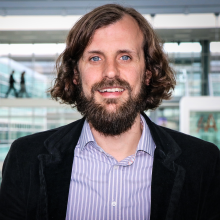
Projects from Prof. Dr. Oliver Müller
DynOpt-San
The aim of the project is to support the energy-efficient refurbishment of apartment buildings in neighborhoods with digital tools. Among other things, we are developing an AI-based energy manager that can predict and control the demand and supply of energy in the context of integrated solar heat pump systems across several apartments and ...
Duration: 01/2024 - 12/2026
Funded by: BMWK
HeatTransPlan
The decarbonisation of industrial process heat is a challenge of the energy transition. In the predominantly fossil-fuel heated temperature range up to 200 °C, which accounts for about 40 % of the process heat demand, there is a barely tapped potential for reducing greenhouse gas emissions in the use of waste heat through heat recovery and heat ...
Duration: 01/2024 - 12/2026
Funded by: BMWK
Contact: Prof. Dr. Oliver Müller, Prof. Dr.-Ing. Henning Meschede, Dr.-Ing. Florian Schlosser
DC2HEAT - Data Centre HEat Recovery with AI-Technologies
The DC2HEAT project aims to create an AI lighthouse for the use of waste heat from data centers using Frankfurt as an example. DC2HEAT is intended to help ensure that the dynamically growing data center infrastructure can be operated in a climate-friendly manner. The aim is to avoid the use of fossil fuels to supply heat in Frankfurt and other ...
Duration: 08/2023 - 07/2026
Funded by: BMUV
Contact: Dr. Gunnar Schomaker, Prof. Dr. Oliver Müller, Prof. Dr.-Ing. Henning Meschede
AProSys - AI-supported assistance and forecasting systems for sustainable use in intelligent distribution network technology
Climate and energy policy is rapidly changing the energy supply system in Germany. The nationwide integration of renewable energies and the integration of charging stations for electromobility are causing a high level of dynamism that is currently almost impossible to quantify. A forecast of potential outages that adapts to the dynamic power supply ...
Duration: 01/2023 - 12/2025
Funded by: BMWK
Contact: Sascha Kaltenpoth, Prof. Dr. Daniel Beverungen, Dr. Philipp zur Heiden, Prof. Dr. Oliver Müller
Datenraum Kultur
For those interested in culture who are looking for interesting events, the networking of cultural platforms provides easy access to comprehensive information in the context of the event including further offers (e.g., booking system, gastronomy, hotel industry, mobility) as well as data-based recommendations through data aggregation, ...
Duration: 07/2022 - 02/2025
Funded by: BKM
Contact: Dr. Simon Oberthür, Prof. Dr. Dennis Kundisch, Prof. Dr. Daniel Beverungen, Dr. Philipp zur Heiden, Prof. Dr. Oliver Müller
BPM-I4.0 - Process mining for analyzing and prescribing industrial core processes
Nowadays, companies and their processes have to be adapted ever more quickly and flexibly. Process mining methods can create transparency and a better understanding of processes. Process mining makes it possible to identify, analyze and improve business processes based on data.Up to now, process mining research has primarily focused on structured ...
Duration: 04/2021 - 06/2023
Funded by: MWIKE NRW
Contact: Prof. Dr. Daniel Beverungen, Prof. Dr. Oliver Müller
tRATEmark - Automated evaluation of word marks using machine learning methods
Today, intangible assets determine an average of 84% of a company's value. Among these intangible assets, brands play an important role, which in the form of words, phrases and logos significantly favor the market success of a company. The project aims to develop a method for the automated valuation of brands that is capable of continuously ...
Duration: 03/2021 - 05/2023
Funded by: BMWK
KIAM: Competence center AI in the working world of industrial SMEs in OstWestfalenLippe
AI for a better working worldHow will artificial intelligence change the world of work? How can companies use new technologies to relieve their employees and increase their competitiveness? And how can employees be prepared for the change? Answers to these questions will be provided by the "AI for the working world of industrial SMEs" (KIAM) ...
Duration: 10/2020 - 09/2025
Funded by: BMBF
